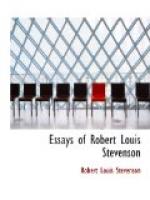[Note 25: Purcel. This stands for Mr. Edmund Gosse (born 1849), a poet and critic of some note, who writes pleasantly on many topics. Many of Stevenson’s letters were addressed to him. The two friends first met in London in 1877, and the impression made by the novelist on the critic may be seen in Mr. Gosse’s book of essays, Critical Kitcats (1896).]
[Note 26: I know another person. This is undoubtedly Stevenson’s friend Charles Baxter. See the quotation from a letter to him in our introductory note to this essay. Compare what Stevenson elsewhere said of him: “I cannot characterise a personality so unusual in the little space that I can here afford. I have never known one of so mingled a strain.... He is the only man I ever heard of who could give and take in conversation with the wit and polish of style that we find in Congreve’s comedies.” (Balfour’s Life of Stevenson, I, 105.)]
[Note 27: Restoration comedy ... Congreve. Restoration comedy is a general name applied to the plays acted in England between 1660, the year of the restoration of Charles II to the throne, and 1700, the year of the death of Dryden. This comedy is as remarkable for the brilliant wit of its dialogue as for its gross licentiousness. Perhaps the wittiest dramatist of the whole group was William Congreve (1670-1729).]
[Note 28: Falstaff ... Mercutio ... Sir Toby ... Cordelia ... Protean. Sir John Falstaff, who appears in Shakspere’s King Henry IV, and again in the Merry Wives of Windsor, is generally regarded as the greatest comic character in literature.... Mercutio, the friend of Romeo; one of the most marvellous of all Shakspere’s gentlemen. He is the Hotspur of comedy, and his taking off by Tybalt “eclipsed the gaiety of nations."... Sir Toby Belch is the genial character in Twelfth Night, fond of singing and drinking, but no fool withal. A conversation between Falstaff, Mercutio, and Sir Toby would have taxed even the resources of a Shakspere, and would have been intolerably excellent.... Cordelia, the daughter of King Lear, whose sincerity and tenderness combined make her one of the greatest women in the history of poetry.... Protean, something that constantly assumes different forms. In mythology, Proteus was the son of Oceanus and Tethys, whose special power was his faculty for lightning changes.
“Have sight of Proteus rising from the sea.”—Wordsworth.]
[Note 29: This sequel was called forth by an excellent article in The Spectator, for 1 April 1882, and bore the title, The Restfulness of Talk. The opening words of this article were as follows:—“The fine paper on ‘Talk,’ by ‘R.L.S.,’ in the Cornhill for April, a paper which a century since would, by itself, have made a literary reputation, does not cover the whole field.”]




